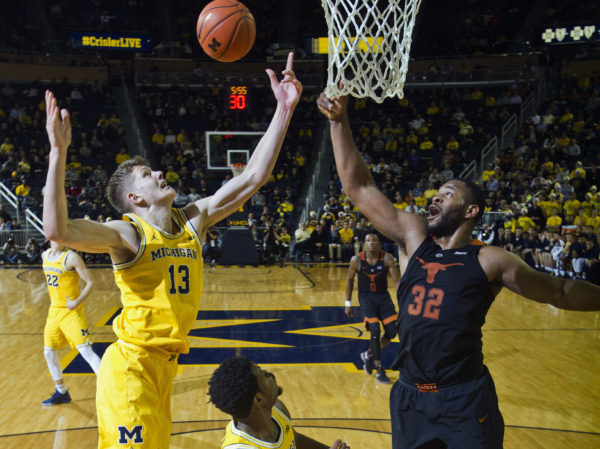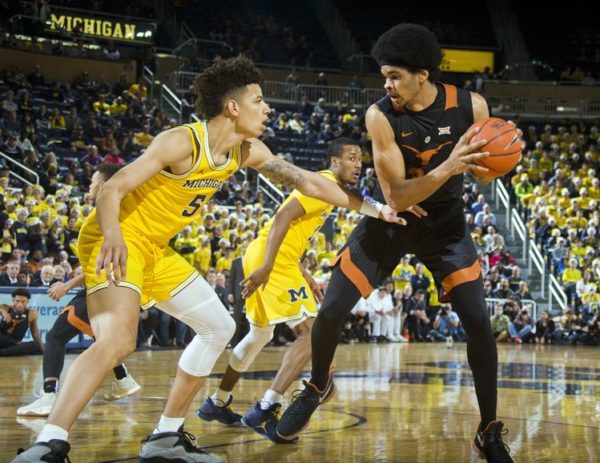Emerging Frontcourt Providing Michigan With New Ways to Win
Posted by Tommy Lemoine on December 8th, 2016Michigan’s 53-50 victory over Texas on Tuesday night was anything but vintage John Beilein basketball. The Wolverines—usually an offensive-leaning unit heavily led by guard play—scored 0.87 points per possession against the Longhorns, with its veteran starting backcourt combining for just 13 points on 4-of-19 shooting. Instead, Beilein’s group relied upon two facets of the game seldom mentioned in the same breath as Michigan basketball: stingy team defense and major offensive production from its big men—namely, sophomores Mortiz Wagner and D.J. Wilson. For a team short on depth and struggling to find a consistent scorer, the newfound production in the paint was a welcome surprise. To understand just how uncharacteristic the victory was, consider this: Michigan had not won a game in which it scored fewer than 0.90 points per possession since February 23, 2008—Beilein’s first year on the job. Much like that contest—a 49-43 win over Illinois—Tuesday’s affair came down to which team could eke out enough late buckets without compromising its defensive intensity. For the Wolverines, both the late buckets and the intensity were supplied by Wagner.

Forward Moritz Wagner was instrumental in Michigan’s win over Texas (AP Photo/Tony Ding)
“I thought [Wagner] was the best player on the floor tonight,” Texas head coach Shaka Smart said afterwards. “He can shoot, he’s 6’11”, he can put the ball on the floor… Tonight he was constantly in attack mode.” Not only did the German import lead Michigan with 15 points on 7-of-13 shooting, he came up with both the go-ahead putback and the game-winning block in the game’s closing seconds, his emotions pouring out as the clock hit zeroes. The sequence was a testament to both his rare offensive skill set and his improving defensive discipline. “Mo’s blocking shots really for the first time in his life,” Beilein said of Wagner. “He’s learning to be a bigger presence at the rim. I think he’s making major steps defensively right now.”
Standing at 6’11”, Wagner’s offensive prowess has never been in question. His quickness, refined post moves, and ability to stretch the floor (9-of-18 on three-point attempts) for a player his size make him unguardable at times. Late in the first half on Tuesday, Wagner pulled off a behind-the-back crossover against Texas center Jarrett Allen that drew audible “oohs” from the Crisler Center crowd. What has been the real surprise, though, is Wagner’s newfound comfort and effectiveness on the defensive end. He’s done a better job staying in position and holding his ground, which has enabled Beilein to leave him on the floor late in games. In turn, the uptick in minutes has resulted in an uptick in offensive production; over the last four contests, Wagner has averaged 14.8 points in 22.8 minutes per outing, both well above his career averages. “With Mo’s emergence right now, it gives us another way to play,” Beilein said.

D.J. Wilson remains key to the Wolverines’ success. (AP Photo/Tony Ding)
But Wagner isn’t alone. Wilson, a 6’10” Sacramento native, has also provided a much-needed spark. Against Texas, he scored 13 points (5-of-6 FG) to go along with six rebounds, two blocks and two steals. His length and athleticism enable Wilson to guard multiple positions—the sophomore did outstanding work against the 6’11” Allen throughout much of the game on Tuesday—and he’s demonstrated excellent rebounding instincts to boot. According to KenPom, Wilson was Michigan’s MVP against the Longhorns. “He’s grown by leaps and bounds, as you can see,” Beilein said of Wilson earlier in the week, a few days after recording a double-double (15 points, 11 rebounds) against Kennesaw State. The emergence of Wagner and Wilson could not have come at a better time for Michigan. For as good as seniors Zak Irvin and Derrick Walton (7-of-12 three-point field goals vs. SMU) have been at times this season, they’ve occasionally been nearly as bad, failing to provide the consistent scoring punch Beilein demands of his guards. Fresh off a 23-point performance against Virginia Tech on November 30, Irvin (three points, five assists, three turnovers) went scoreless for the first 36 minutes on Tuesday. Walton, who turned the ball over five times, was not much better, and slasher Muhammad-Ali Abdur-Rahkman—often considered the team’s “X-factor”—looked utterly disinterested for most of the night.
“[Irvin] and Derrick [Walton] did not have a good game. They’re just better than that,” Beilein said afterward, adding about Abdur-Rahkman, “He’s lost some confidence right now.” The real issue plaguing the backcourt, however, may have more to do with depth (or lack thereof) than anything else. Freshman Xavier Simpson (1.2 PPG) played just three minutes against the Longhorns, and newcomer Ibi Watson (1.2 PPG) didn’t play at all, forcing Walton, Irvin, and Abdur-Rahkman to play heavier minutes than Beilein would like. Until either develops into a reliable rotational option, that scenario is likely to continue playing out. And that’s exactly why Wagner and Wilson have been so important for Michigan. Their impact on both sides of the ball enabled the Wolverines to win a low-scoring grinder this week, and should continue to keep Beilein’s group competitive on nights when the backcourt struggles to produce. “You don’t see us win many where it’s just about our defense,” the 10th-year coach said about Michigan’s victory. “It was gritty.” Whether that defensive grit and frontcourt production will be enough to upend a red hot UCLA team this Saturday remains to be seen.









































